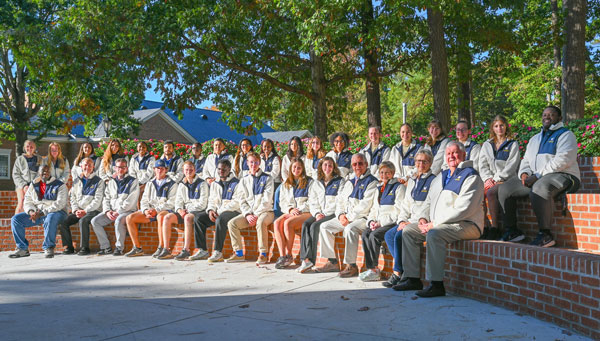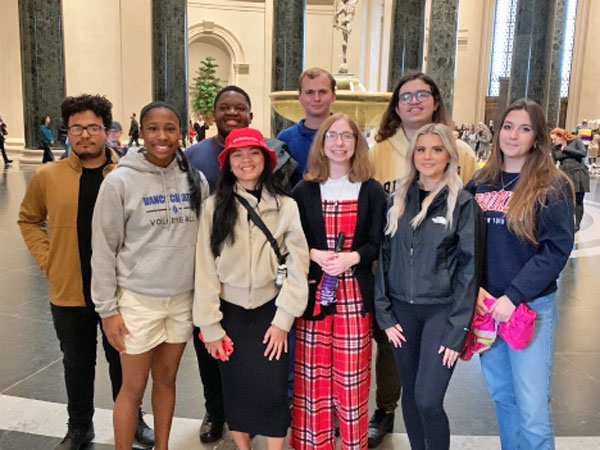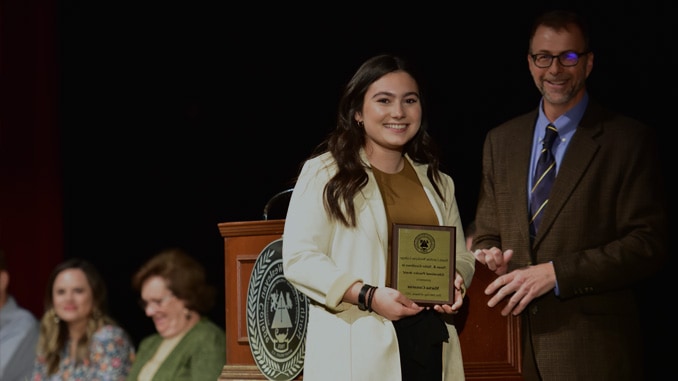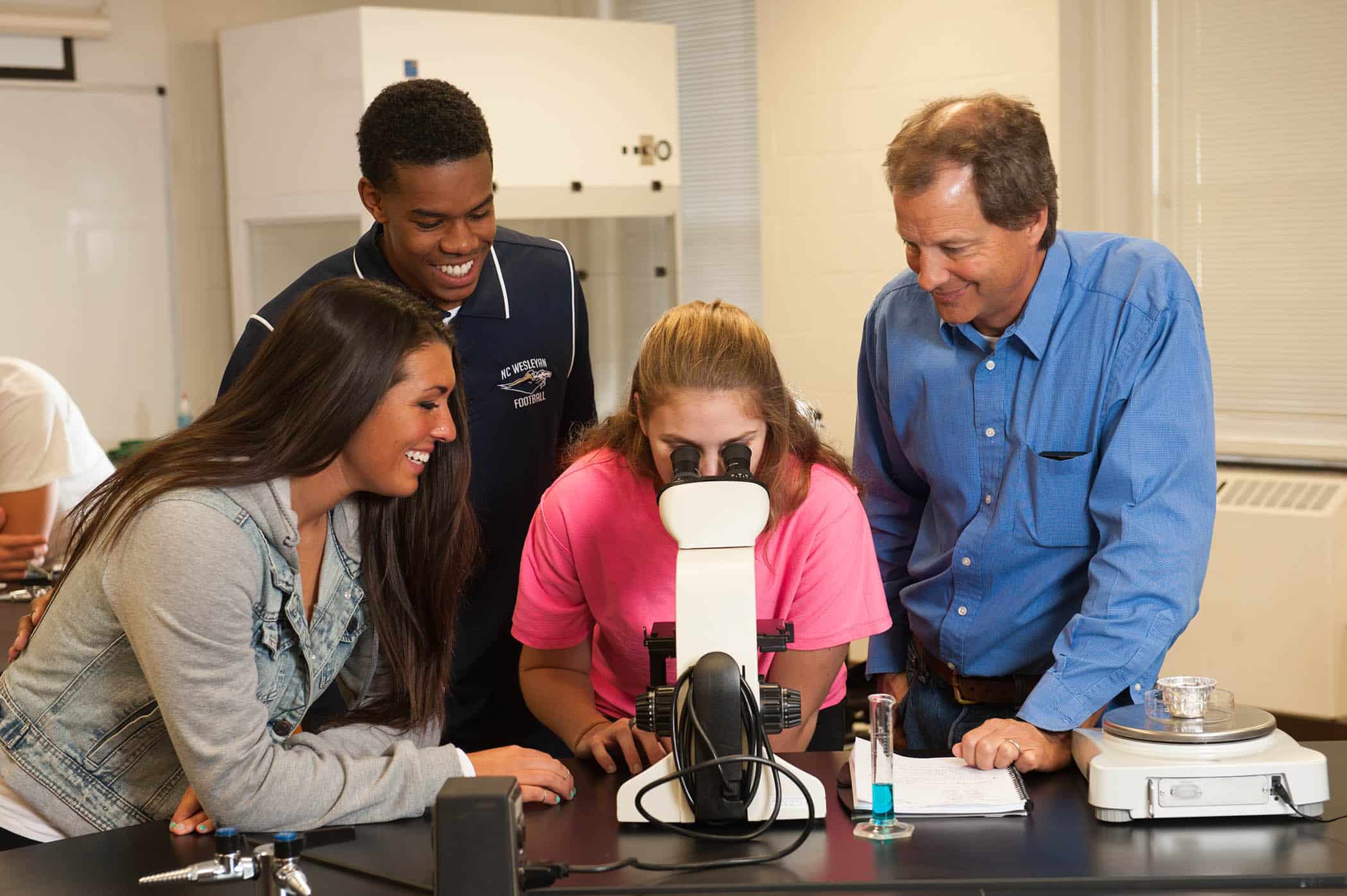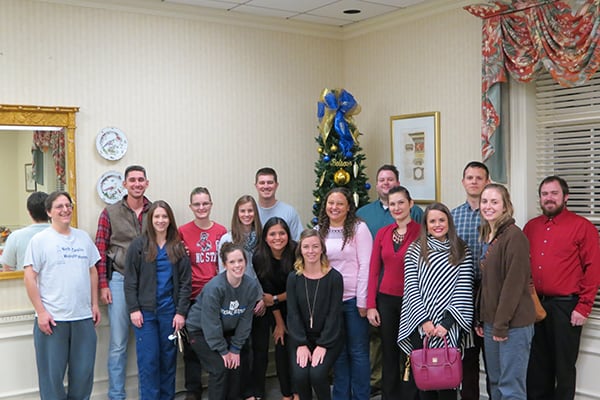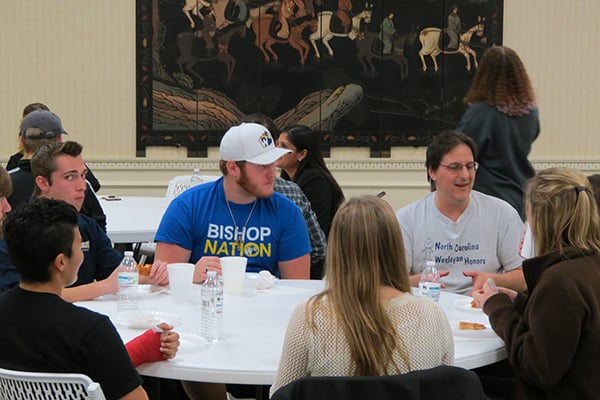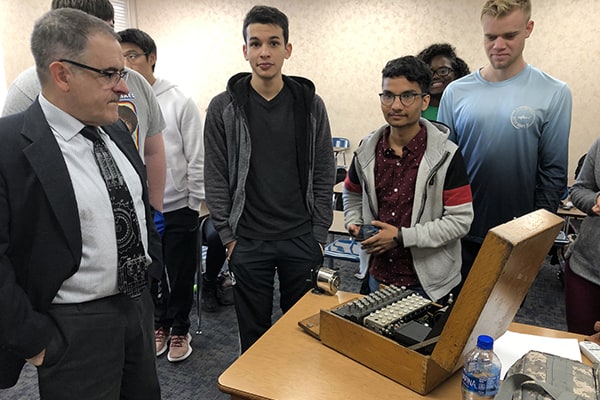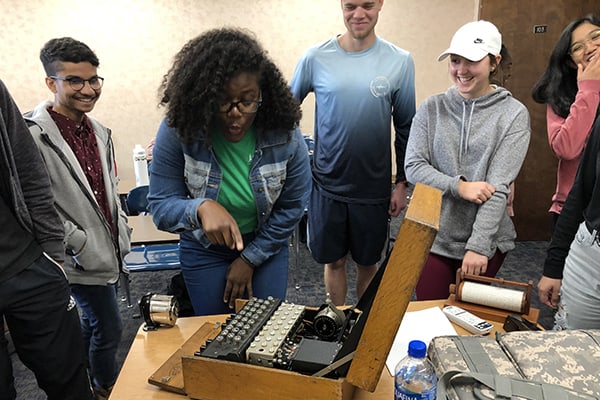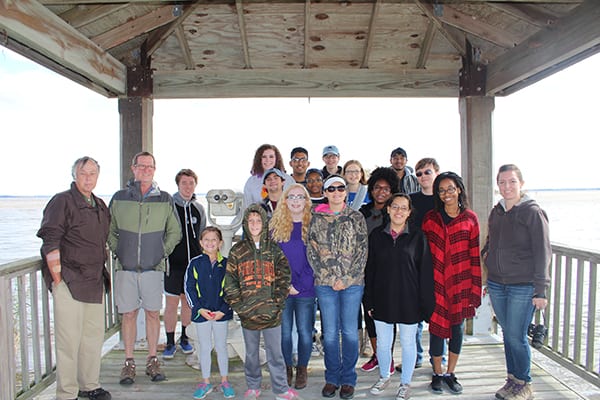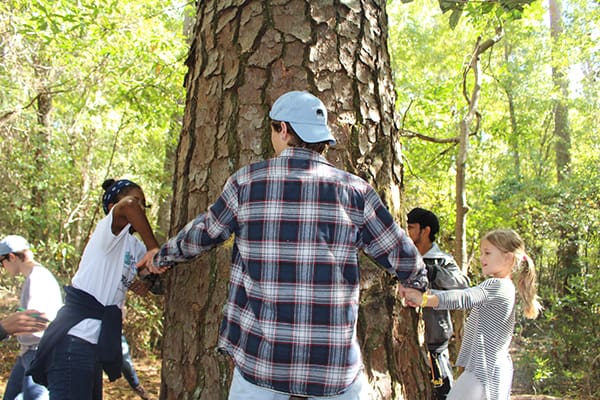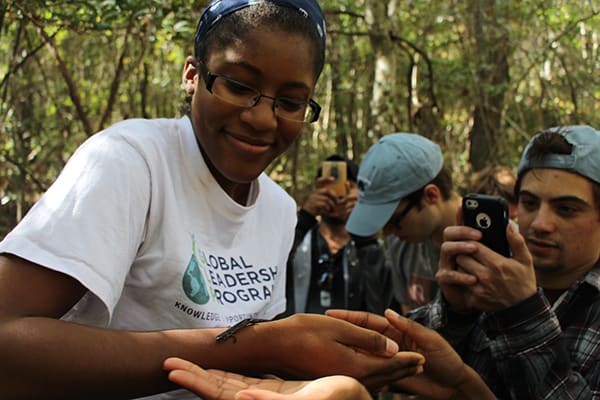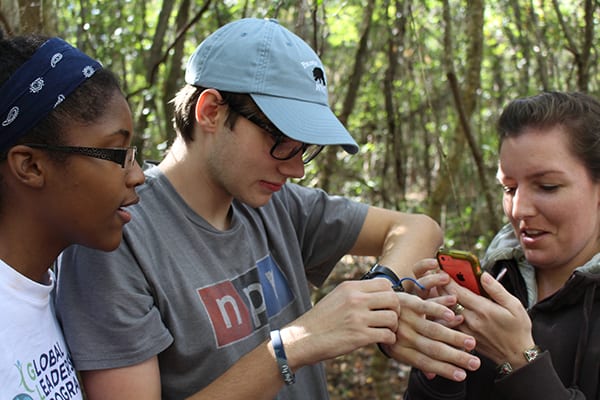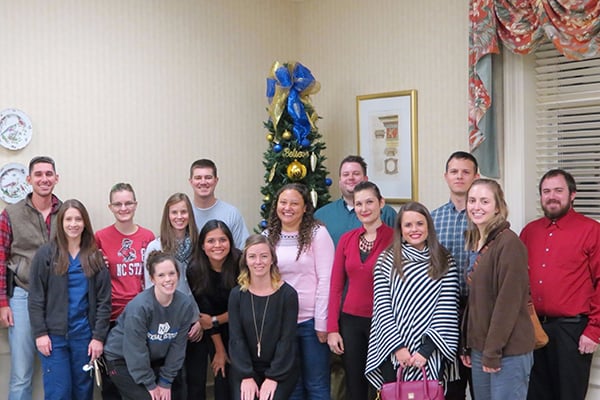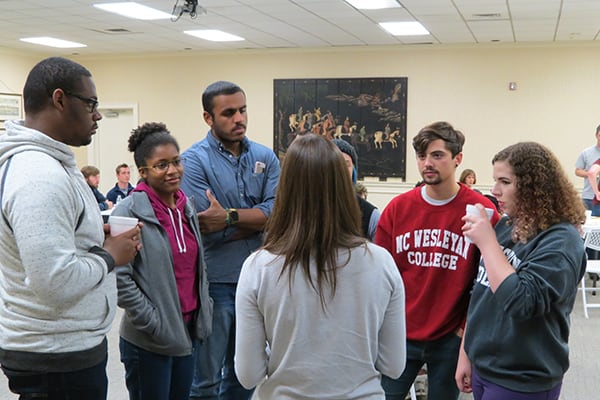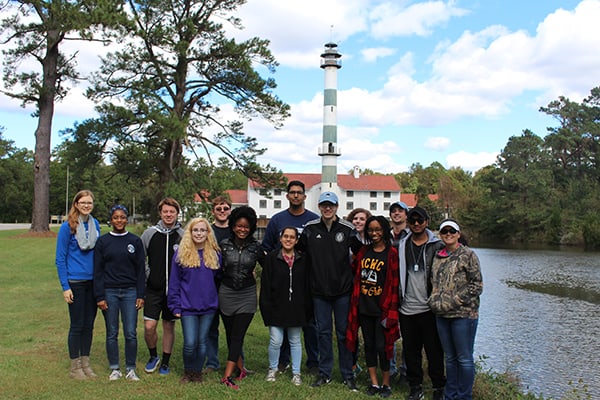Taylor-Crocker Honors Program
A program that offers unique opportunities from travel and networking to research and hands-on experiences.
Are you a high-achieving student with strong character and a desire to stretch your imagination? If so, the Taylor-Crocker Honors Program is for YOU!
North Carolina Wesleyan University offers a select group of students the opportunity to complement their degree program with a series of challenging and rewarding courses. Freshmen enrolled in the Taylor-Crocker Honors Program take special freshman courses in English and Humanities. Honors Program students then take one honors course each semester during their sophomore and junior years. As seniors, students complete an honors project in some area of interest.
The Taylor-Crocker Honors Program offers students the opportunity to develop a close community of learning and to take courses from some of the best faculty members at the University. Being in the Honors Program does not add to a student’s course load, but it does add variety and depth to her or his college experience. Transcripts of honors graduates include recognition that they completed the Honors Program.
Students take unique courses with other students who are academically motivated and study with outstanding professors. Participation in the program shows that students take a special interest in their education and will receive special recognition from the University. Future employers and graduate schools notice this on the student’s transcript.
The program involves a sequence of courses. For answers to questions about this program or to request an application, please contact the Taylor-Crocker Honors Program Director, Dr. Bill Yankosky at byankosky@ncwu.edu.
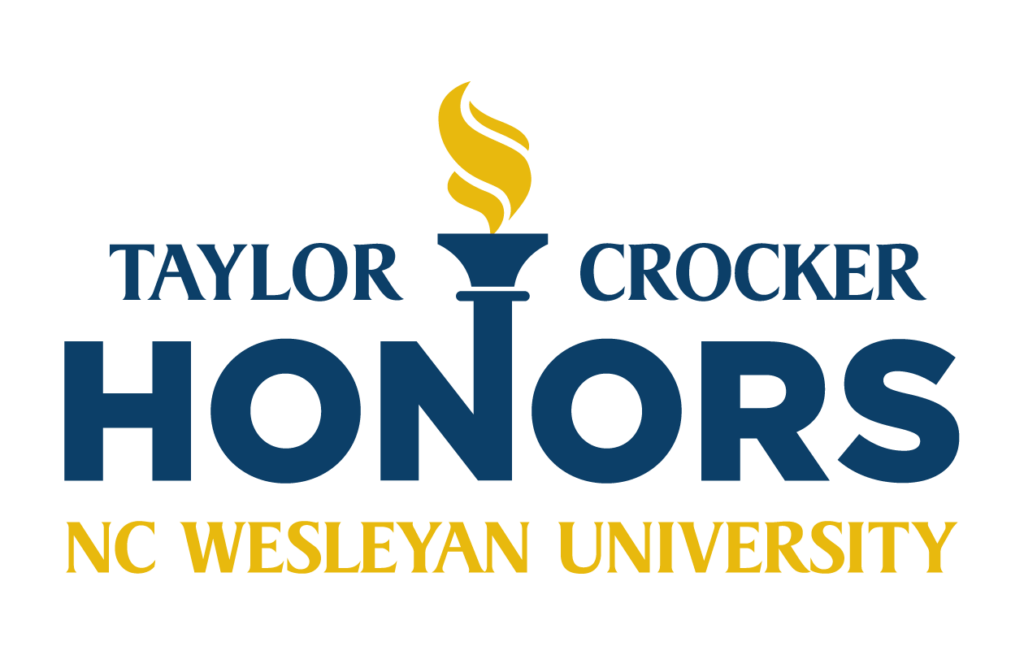
- Incoming first-year students and transfer students who earned a GPA of 3.5 or higher at their previous school.
- NCWU second-semester, first-year students who have an NCWU GPA of 3.5 or higher and have also successfully completed ENG 111.
- NCWU students who have reached sophomore level or above who have an NCWU GPA of 3.5 or higher and have also successfully completed ENG 111 and ENG 112.
How the Honors Program Works
The Program consists of a sequence of courses specially designed for honors students which are taught by outstanding professors. Individuals in the Program take unique courses with other academically talented and motivated students and have the opportunity to take Honors Option courses that provide greater depth of study of a course in the regular curriculum.
First-year honors students enroll in special Honors sections of English in the fall and Humanities in the spring, which carry a total of 6 semester hours (s.h.) of credit. Transfer students or students entering the Program late can waive these courses.
During their sophomore and junior years, honors students complete a total of 12 s.h. of honors courses, typically by enrolling in one 3 s.h. honors course each semester. A variety of honors courses are offered every semester and may come from areas in any of the University’s four schools:
- Business
- Education & Social Sciences
- Humanities
- Mathematics/Science
Professors usually design these unique courses for the students in the Program. Some of the courses can be used to satisfy general education requirements.
During the senior year, Honors Program students design and complete a supervised, interdisciplinary project consisting of a written and oral component which receives 6 s.h. of credit.

History of the Program
Originally established in 1988 under the leadership of former English Professor, Dr. Steve Ferebee, the Program was renamed in 2009 when Roger G. Taylor, class of 1970, and his wife, Gaile, met with former President James A. Gray III. The funding that was provided for The Roger G. and Gaile Davenport Taylor Honors Program covered memberships and attendance to Honors Association Conferences, Honors Project supplies and thesis binding, guest speakers, social events for team building, professional development, Honors symposiums and travel.
In 2014, NCWU Board Chair, Dr. Dan Crocker and wife Brenda, came alongside the Taylors to support the initiative. The Crockers also established the Dr. James Durant Melton Outward Bound Scholarship that supported Honors Students who participated in the NC Outward Bound Program which offers challenging outdoor adventure programs.
In addition to the special first-year honors courses and Honors Project courses, a variety of courses are offered each semester, specifically for sophomore and junior honors students.
Honors Courses Taught Over the Past Several Years
- First-Year Honors Course Sequence
– ENG 195 Honors English (Each Fall) – Lee Templeton (English)
– HUM 203 Mythology (Each Spring) – Lee Templeton (English) - Ancient Religious Texts of Africa and the Middle East (Fall 2023) – Shane Thompson (Religious Studies)
- African American Literature (Fall 2022) – Jim Bowers (English)
- Conservation Behavior (Fall 2024) – Dimitri Blondel (Biology)
- Cryptology (Fall 2021, Fall 2023) – Bill Yankosky (Math)
- Data Analysis and Visualization (Spring 2022, Spring 2024) – Jackie Lewis (C.I.S.)
- Determinants of Dietary Patterns (Spring 2024) – Danielle Braxton (Health Promotion)
- Environmental Studies (Spring 2025) – Daniel Elias
- Fatal Attraction: Fascism in Two Republics (Fall 2024) – Jarrod Kelly (Political Science) and Chad Ross (History)
- Gender and Sexuality Studies: Literatures of Love and Pain (Spring 2024) – Doreen Thierauf
- History Goes to the Movies (Fall 2023) – Jonathan Sarris (History)
- Icelandic Sagas (Spring 2022, Spring 2025) – Lee Templeton (English)
- Math and Art (Fall 2022) – Gail Stafford (Math)
- Positive Psychology (Spring 2023, Spring 2025) – Fred Sanborn (Psychology)
- Sacred Art (Spring 2023, Fall 2024) – Andrew Stern (Religious Studies)
- Weimar Germany or Weimar Amerika? You decide (Fall 2021) – Chad Ross (History)
During senior year, Taylor-Crocker Honors Program students design and complete a supervised, interdisciplinary project consisting of a written and oral component. The project gives honors students the unique opportunity to work on an individual basis with a faculty member. A variety of honors projects have been completed over the years and some have even led to publications in academic journals. Several students have presented work related to their honors projects at professional conferences.
Some Honors Projects, and the students who completed them during the past several years, include:
- A Case Study Assessing the Physiological Demands of Guitar Performance – Enrique Chang
- A Literature Review on Singapore’s Economic Miracle: What are the lessons to be learnt? – David Bolivar
- A Small-Scale Approach to Coral Research – Alyssa Brookhart
- An Examination of Malaria, African Trypanosomiasis, and American Trypanosomiasis: Blood-borne Parasitic Infections Spread through Vector Transmission – Angela Bird
- An Exploration of Race Film Theories in the Context of Sports Media – Ali Cucinotta
- An Exploration of Singular Values and the Singular Value Decomposition of Matrices – Julia Trimmer
- Assessment of Sport Concussion During the Playing Session in Collegiate Sports – Hayleigh Heckman
- Brisked Business Plan – Daniella Umubyeyi
- Changes in the Family through the Lense of Christian Ethics – Key Strickland
- Cloud Computing in Agriculture of Nepal: Increasing Crops Yield Using Soil Sensors – Prawachan Dhungana
- Comparing the Body Image of Male Athletes to Their Non-Athlete Counterparts – Madeline Graham
- Contemporary Rewrites of the Bible: Rewriting David and Saul – Abigail Guzman
- Corruption and its Impact on Key Socioeconomic Factors and Human Development in Developing Countries – Jhonny Acosta
- Dear Loved One, How I Need You: An Empirical Study on the Relationship Between Attachment Styles and Depression – Angela Groeneveld
- Does Product Type Affect Brand Loyalty Among Different Age Groups and Gender Identities? – Shanice Tillery
- Dream Tress Boutique Business Plan – Janasia Joyner
- Duels: Wars of Rules – Solomon Pownall
- Eastern Carolina Lighting LLC. – Matthew Coltren
- Effects of Coaching on College Athletes’ Psychological Well-Being In vs. Out of Season – Jordan Fransee
- Effects of Water Quality on Spatial Distribution of Lampetra Aepyptera – Christian Gardner
- Exploring Age-Related Differences in Work-From-Home Preference – Will Speight
- From “Mammy” in Gone with the Wind to Tyler Perry’s “Angry Black Woman”: A Qualitative Content Analysis of the Portrayals of Black Women in Fictional Films from the 1930s to Modern Day -Samantha Valeros
- Frustration Responses in Domestic Cats (Felis catus): Behavioral Analysis in a Food Obstruction Experiment – Roberta Vulcano
- Generational Perceptions of Intersectional Feminism: Social Media as the New Public Sphere for a Feminist Education – Mary Catherine Davis
- Growing a Small Business Through Social Media; A Creative Case Study of New Wave Fashion – Rebecca Solis-Wanous
- High and Low Performer Differences in Force Plate Derived Neuromuscular Performance in Female NCAA Division III Soccer Player – Kelsey Hutchison
- In the Woods Somewhere: A Screenplay – Sierra Joyner
- Internal Auditing and De-risking Blockchain-based Environment Under a Global Regulatory Framework – Han Jumashov
- Neuromuscular and Aerobic Performance Is Associated With 20- and 40-meter Sprint Times in Female Collegiate Soccer Players – Isabel Neall
- Next Era Marketing – A Digital Marketing Firm – Blaise Gourley
- Physical Activity and Depressive Symptoms during the COVID-19 Stay at Home Order in North Carolina – Madison Gill
- Political Socialization, Trust in Government, and Voter Turnout Among University Students – Blaire Harley
- Psychological and Societal Factors in Serial Killers – Allison Wichrowski
- Racial Disparity in the Judicial System of the United States Against African Americans (1865- Present) – McKaylah Lee
- Ransomware: Education as a Deterrent against a Pervasive Threat – Anthony Boykin
- Seasonal Changes in Physical Performance–Related Variables in Female NCAA Division III Soccer Players – Rolandon Valladarez
- Sleep and Depressive Symptoms after Sport-Related Concussion – Megan Mackey
- Socialization and the Normalization of Deviance: A Partial Test of Social Learning Theory -Jacob Aldridge
- The Art of Slow: Why The Time and Effort Put into Handcrafted Objects Makes Them More Valuable Than Ever – Naomi Pilapil
- The Business of the WNBA: The Lives and Professional Growth of Women Athletes in American Basketball – Nadia Simmons
- The Cultural Influence of Packaging Color on Consumer Perception – Lilian Monroy
- The Effect of Pandemic and Childhood Stress and The Impact of Resiliency on College Student’s Perceived Academic Performance -Elizabeth Perry
- The Effectiveness of The Sarbanes-Oxley Act & Ethics in Preventing Corporate Accounting Fraud – Alexa Yaravide
- The Effects of Pet Ownership on the Mental Health of North Carolina Wesleyan College Students – Rebecca Mitchell
- The Efficacy of Facemasks Against Respiratory Airborne Pathogens – Quincey Packer
- The Greatest Word in the Bible is Hope”: Restoring Identity and Reinstating Dignity for Survivors of Human Trafficking – Natalie Larson
- The Impact of Climate Change and Human Activities on Whale Populations – Desiree Walker
- The Impact of Gender and Race on Legislation: A Study of How Legislators’ Gender Influence their Support of Women’s Interest Policies – Grace deMontesquiou
- The Impact of Wastewater Treatments on the Presence of Pharmaceuticals in Hospital * Effluents – Michelle Sackey-Ansah
- The Long Road To Black Women’s Health Equity – Skylar Hopper
- The Name Game: Perceptions of Names as Possible Determinants of Success in Education – Ariel Wilson
- The Relationship Between the Media and Serial Killers – Makayla Moore
- Two Simplified Post-Quantum Cryptosystems Demonstrated on the TI Graphing Calculator – Lexi Reinert
- Using Diagrams to Improve Student Success with High School Math Word Problems – Jadéjah Robinson
- Why Do People Believe COVID-19 Conspiracy Theories and What Are the Consequences – Victoria Thompson
Students who participate in the Taylor-Crocker Honors Program show that they take a special interest in their education and receive special recognition from the University. Besides challenging and enriching instruction, the Honors Program provides its students with increased opportunities to meet visiting scholars, civic leaders and performing artists; travel to museums, the theater and sites of cultural, historical or scientific importance; and attend or present at conferences. Honors Program students may gather for study or conversation in the Honors Lounge. There is also a student organization on campus, the Student League of Academic Prestige (S.L.A.P.) comprised of the Honors Program students.
Every honors course that students take is marked as such on their transcript. Students who complete the entire program receive special recognition on their degree, at graduation and on their transcript. Graduates of the Program receive a special blue and gold cord to wear at graduation. Students enrolled in the Taylor-Crocker Honors Program also receive a special scholarship starting at $500 each semester and increasing over their time in the Program.
NCWU Honor students enjoy the benefits of a comfortable, dedicated space just for them, equipped with snacks to relax, study, read or socialize. This space is equipped with a large conference table for meetings as well as computer workstations.
The Honors Lounge was renovated in 2022 with the help of the Taylor-Crocker families. Read entire article.
Hear what other students and faculty say about the Taylor-Crocker Honors Program...
Lexi Reinert ’23, Honors Program Graduate, Math and C.I.S. double major
Rebecca Mitchell, Honors Program 2022 Graduate and Biology and Psychology Double Major
Tiara Joyner, Honors Program Graduate and Justice Studies & Psychology Double Major
Chynna Laws, Honors Program Graduate and Criminal Justice & Psychology Double Major
Mikey Case, Honors Program Graduate and Mathematics & Psychology Double Major
Quincey Packer ’24, Honors Program Graduate and Biomedical Science Pre-Med Major
Kathleen Penrod, Honors Program Graduate and Environmental Science Major
Fred Sanborn, Assistant Director of the Honors Program and Professor of Psychology
Gail Stafford, Associate Professor of Mathematics recalling her experience teaching her “Problem Solving” honors course.
Bishal Karanjit, Honors Program Graduate and Computer Information Systems Major
Caitlin BrabbleRose, Honors Program Graduate and Biology Major




